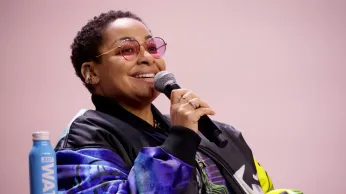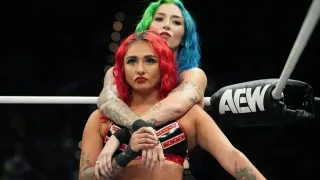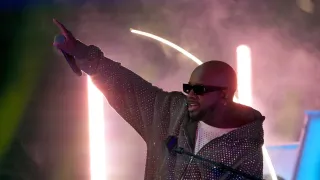
5 hours ago
Raven-Symoné Cites Industry Pressures and Body Shaming as Reasons for Stepping Away from Music
READ TIME: 2 MIN.
Raven-Symoné, a multifaceted entertainer known for her iconic roles in “That’s So Raven” and “The Cheetah Girls,” has long been a familiar face in entertainment. Her career began on “The Cosby Show,” and expanded to music, with four studio albums and tours supporting hits like “Double Dutch Bus” and “Backflip” . Despite her accomplishments, Symoné’s music career never reached the heights of some of her Disney Channel contemporaries.
In a recent interview on the podcast “Sorry We’re Cyrus,” hosted by Tish and Brandi Cyrus, Raven-Symoné shared candid insights into her decision to leave the music industry. She described a pivotal moment when industry executives demanded she perform in bathing suits, a requirement she found unacceptable. “The mandatory outfit was a bathing suit, and I’m not going to get in one,” she stated, emphasizing her refusal to comply with industry norms that prioritized revealing outfits over talent .
Symoné’s decision was further solidified by instances of explicit body shaming from music executives. During the same interview, she recounted a particularly hurtful comment made to her mother by a label executive: “‘She’s so fat. How can she do so long on stage?’” . The experience left a lasting impact, prompting her to walk away from a potential pop career. She later revealed that the damaging environment led her to seek therapy, a step she shares with other former Disney stars who faced similar pressures .
Symoné’s openness about mental health and seeking help reflects a growing conversation within the entertainment industry about the toll that public scrutiny and industry demands can take on artists, particularly those from marginalized communities. She described the industry as one that “will break you down,” highlighting the importance of boundaries and self-care .
Raven-Symoné’s story underscores broader issues of gendered expectations and body standards in the music business. Her refusal to adhere to the “machine” that often dictates the image and presentation of pop stars marks a significant stance for autonomy and self-respect . She explained, “I just felt there was a time in music where it was like, the more naked you are on stage, the better it is, and I’m not going to do that” .
As an openly queer woman, her experience highlights the intersectional challenges faced by LGBTQ+ artists who may feel additional pressure to conform to heteronormative beauty and behavior standards within mainstream entertainment. Symoné’s visibility and willingness to speak out are especially meaningful in a cultural landscape where LGBTQ+ people have historically faced erasure or stereotyping. Her actions support the ongoing conversation about the need for authentic representation and the rejection of harmful norms in the industry .
Though Raven-Symoné’s music career was curtailed by industry pressures, she has successfully redirected her talents to acting, producing, and advocacy. She described her decision to leave music as both “a blessing and a curse,” noting that while she didn’t benefit from the full support system enjoyed by some peers, she gained valuable freedom to define her own path .
Her story serves as a powerful example of resisting unhealthy industry expectations, prioritizing mental health, and embracing one’s identity—messages with enduring significance for LGBTQ+ youth and anyone navigating pressures to conform.






